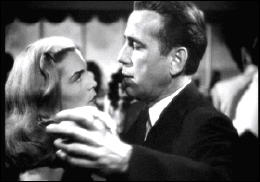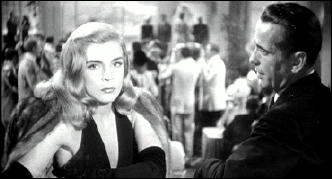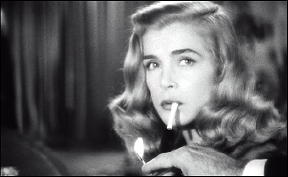Wed 18 Jul 2012
A Movie Review by Dan Stumpf: DEAD RECKONING (1947).
Posted by Steve under Movie stars & directors , Mystery movies , Reviews[22] Comments
DEAD RECKONING. Columbia, 1947. Humphrey Bogart, Lizabeth Scott, Morris Carnovsky, Marvin Miller, Wallace Ford. Screenplay by Oliver H.P. Garrett and Steve Fisher, based on a story by Gerald Adams and Sidney Biddell, who also produced. Director: John Cromwell.
Humphrey Bogart spent most of his career at Warner Brothers, where all his best films were produced. From The Petrified Forest to The African Queen, and all the way through The Maltese Falcon, The Big Sleep, Key Largo, and countless others, when you think of a Bogart Movie, you are probably thinking of the Warners’ ambiance: the stock company of supporting players, cameramen, composers and all the other technicians, who contributed so much to the Bogart mystique.

For some reason, though, Warner’s decided in the late 40s to loan their top male star to Columbia, the smallest of the Major studios. It was run in those days by Harry Cohn, a man of epochal unpleasantness, whose massive funeral prompted the comment, “Give the people what they want and they’ll come out for it.”
Under his reign, Columbia was Home to Frank Capra and the Three Stooges, with most of its product canted toward the latter end of the scale. Nonetheless, it must be admitted that when Cohn got hold of a good thing he milked it dry, and turned out not a few classics in the process.
So when they got their hands on Humphrey Bogart for a single picture in 1946, Columbia beat their live horse for all it was worth, by hiring a corps of writers to steal all the best bits from Bogie’s biggest hits, and surrounding him with (mostly unknown) character actors, who somehow managed to look and act like a close approximation of the Warners Stock Company. The result was the Ultimate Bogart Picture.

Dead Reckoning is not particularly witty, not noticeably intelligent, and not at all original, yet it has a certain memorable quality all its own: It contains so many elements from so many (better) Bogart movies, that it somehow becomes the apotheosis of them all.
The plot, as nearly as I can determine, involves the efforts of cynical, world-weary Rip Murdock (Bogie, of course) to clear the name of a dead army pal, a quest that takes him to one of those echt Film Noir cities populated by Dumb Cops, Cultured Gangsters, Sadistic Goons, Regular Joes, and a blonde, husky-voiced femme fatale played by Lizabeth Scott, a cross between Lauren Bacall and Eugene Pallette.
https://www.youtube.com/watch?v=bL1X3s1R0cE
All of the above, replete with beatings, gambling joints, frame-ups and shoot-outs, gets served up with more precision than originality, accompanied by a Chandleresque voice-over narration that strains its metaphors so hard you can hear their knuckles turning white. (Like that one.)
Yet if you like Bogart Pictures, it’s hard not to enjoy Dead Reckoning, thanks mainly to John Cromwell, a director who deserves a digression all his own:
Cromwell has even less of a reputation than Michael Curtiz, as Hollywood Directors go, and holds an even smaller claim to Personal Style, yet he directed films that somehow outshone the classics of better-known auteurs, perhaps because he never made a fetish of Originality.

Abe Lincoln in Illinois, Since You Went Away, Algiers, Made for Each Other, Son of Fury and The Enchanted Cottage all bear comparison with better-known films like Young Mr. Lincoln, The Best Years of Our Lives, and Casablanca, and his The Prisoner of Zenda (1937) and Caged are arguably the best Swashbuckler and Prison films Hollywood ever produced, even if they came too late in their cycles to be considered “Influential.”
When Columbia turned to John Cromwell to make a film in the Classic Bogart Mold, they knew what they were doing. Cromwell approaches Dead Reckoning totally undaunted by the cliched script and predictable story line.
He gives each tried-and-true scene the freshness that Hawks, Curtiz and John Houston brought to them a few movies back, and backs off at all the right moments to allow his star enough room for the well-known mannerisms, wise-cracks and reaction shots that Bogart buffs dote on.
The result is a film that seems familiar the first time you see it, but none the less likable for that. I didn’t respect Dead Reckoning the morning after I saw it, but I suspect I’ll sleep with it again.
July 18th, 2012 at 9:55 pm
Dan,
Helluva good review for a Helluva good movie! I’ve been a Bogie fanatic all my filmgoing life and still enjoy his movies whenever they’re on the screen. Lizabeth Scott a cross between Bacall & Eugene Pallette? While I enjoy both, I’d never have come up with that combo.
July 18th, 2012 at 10:14 pm
I’ve been a big Bogart fan since the 1960’s and I’ve seen some of his movies many times. I have a cheap paperback listing of his movies that I note everytime I see one of his films, so I can tell the number of times I’ve seen each movie.
DEAD RECKONING I’ve seen 8 times since 1966 and I’ve enjoyed it each time.
July 19th, 2012 at 1:04 am
Paul
My eyes stumbled over that Pallette comparison too!
July 19th, 2012 at 1:05 am
Walker
I’ve not seen the movie that many times, but I can tell you that every time I watch it, I enjoy it more.
July 19th, 2012 at 9:42 am
Steve:
I may have misread this, but The African Queen is not a WB picture. Released by UA and produced independently by Sam Spiegel. Re Harry Cohn. I knew many people who liked him. He had energy and a sense of adventure. Columbia wasn’t so small. From the thirties on they had Capra and Ford there. Cary Grant and Irene Dunne. Many others, but all expenisve, big time film people.
July 19th, 2012 at 10:07 am
Sateve:
I’m a little pressed. Something personal is going on here. But, add Hayworth, Holden, Howard Hawks, Fred Zinneman, Burt Lancaster, Randolph Scott, Glenn Ford, Jean Arthur, Edward G. Robinson to the list of people working at the studio. That they had long term employment contract with only a few seems irrelevent. They were there, and did the work. Oh, and Gene Autry.
July 19th, 2012 at 11:11 am
Our home town theater showed only Columbia serials mostly made by Sam Katzman. It was years before I discovered there were better serials being made.
July 19th, 2012 at 11:17 am
In the middle of watching the trailer for this movie I heard an ad for learning a language in 10 days — luckily it was not as loud as the Bogart!
July 19th, 2012 at 11:31 am
Barry, Comment #5
Thanks for the correction re THE AFRICAN QUEEN. You’re quite right about it being an United Artists release.
As for Columbia Pictures, I remember going to the movies as a kid, once or twice every weekend, and even then every time I saw that Lady Liberty logo at the beginning, it meant I was really going to enjoy that one.
July 19th, 2012 at 11:37 am
Randy, Comment #7
I know that Republic was supposed to have the best serials, but looking at the list of the ones Columbia did
http://en.wikipedia.org/wiki/Category:Columbia_Pictures_film_serials
I think I liked theirs better.
If anyone would like a list of Republic serials, to make your own comparison, here’s another Wikipedia link.
http://en.wikipedia.org/wiki/List_of_film_serials_by_studio#Republic_Pictures
July 19th, 2012 at 11:39 am
Randy, Comment #8
Did you hear the language ad as part of the video soundtrack? I don’t.
July 19th, 2012 at 11:44 am
Me, Comment #4
To follow up on the comment I left just before headed to bed last night.
I’ve been thinking of all the movies I’ve watched more than twice, and I’ve not been surprised to discover that Humphrey Bogart has been in most of them. I suspect, though, that’s true for a lot of people who watch old movies.
As for Lizabeth Scott, I’ve seen more than one of her movies more than once, including this one, and I’ll bet I would have even if Bogart hadn’t been in it.
July 19th, 2012 at 2:44 pm
Lizabeth Scott was in relatively few films, but let me suggest The Strange Love of Martha Ivers, and Pitfall.
July 19th, 2012 at 4:04 pm
I think I may have clicked on something accidentally that was hidden behind the YouTube box. No, the ad for learning a language in 10 days was not part of the Bogart trailer. I often have trouble watching anything on YouTube uninterrupted.
I have a small library of serials (mostly in VHS) and still haven’t watched all of them. Some that I really loved as a kid have not held up in spite of the promise at the time and my faulty memory. As kids we knew from experience that any movie based on a comic strip or comic book character would be a disappointment
July 19th, 2012 at 6:09 pm
Re: Lizabeth Scott
PITFALL was reviewed here (by me) earlier this year:
https://mysteryfile.com/blog/?p=14909
Also —
YOU CAME ALONG
https://mysteryfile.com/blog/?p=14842
TWO OF A KIND (by Walter Albert)
https://mysteryfile.com/blog/?p=14769
— and by me
https://mysteryfile.com/blog/?p=1268
THE COMPANY SHE KEEPS
https://mysteryfile.com/blog/?p=1763
TOO LATE FOR TEARS
https://mysteryfile.com/blog/?p=1303
RED MOUNTAIN
https://mysteryfile.com/blog/?p=1259
July 19th, 2012 at 6:35 pm
Steve:
I suppose I was responding to our take on Scott at the conclusion of your review. Not only had I forgotten you’d reviewed You Came Along, but that I’d commented on your take. In any case, even in Loving You, she was of interest.
July 19th, 2012 at 8:25 pm
Lizabeth Scott also appeared in PULP (1972) an interesting (if not altogether successful) homage to 40s mysteries before such things became fashionable.
As far as Columbia’s status as a studio, Columbia and Universal were traditionally considered the smallest of the “major” studios in the 30s and 40s.
Harry Cohn? Perhaps I maligned him, but stories of his unpleasant behavior were legion in Tinseltown and John Wayne just flat-out refused to work for the man.
There were some entertaining serials from Columbia, but generally they lacked the pace of the Republic product or the chintzy “class” of those from Universal, particularly after Sam Katzman took over
And why hasn’t anyone written a book about Katzman?
July 19th, 2012 at 9:34 pm
PULP was one strange movie, as I recall it, but I’m glad to have a chance to have seen it. I’ve looked for my review of it, but it hasn’t turned up. I might not have written one. Ever since BREAKFAST AT TIFFANY’S, a little Mickey Rooney goes a long ways with me, and sometimes words fail me. (Michael Caine was very good, though, as always)
You’re probably right, Dan, and Randy, too, that the Columbia serials were not as good as Republic’s, say. I’ve watched only one of these chapter plays since I was 12, and what does a kid know about pacing?
July 19th, 2012 at 9:39 pm
Barry, Comment #16.
Lizabeth Scott, as I’m sure you’ve deduced by now, is one of my favorite actresses. She’s always of interest, as far as I’m concerned. The list of movies that have been reviewed on this blog would be a lot longer if I’d written reviews of all the ones I’ve seen.
July 24th, 2012 at 8:35 pm
James Agee quoted someone (Brad Darrach, I think) as describing Lizabeth Scott as a “Milton Caniff version of the Mona Lisa”.
July 24th, 2012 at 9:56 pm
That’s a quote new to me, but I like it!
August 26th, 2020 at 2:59 am
Why were doubles (Over the shoulder shots) used in so many of the later scenes ?